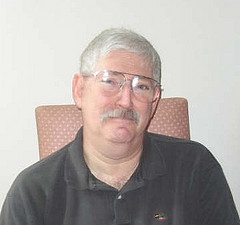The Associated Press revealed today that “retired” FBI agent Robert Levinson was recruited by a band of rogue CIA analysts to run a totally unauthorized spying operation. He’d been working with them for years, and had a contract since 2006 related to writing articles about his “travels.”
 In 2007, Levinson went to the Iranian resort of Kish and promptly disappeared. The State Department insisted he was a private citizen there on private business, and the CIA involvement wasn’t even reported in the media until today, over 6 years after his disappearance.
In 2007, Levinson went to the Iranian resort of Kish and promptly disappeared. The State Department insisted he was a private citizen there on private business, and the CIA involvement wasn’t even reported in the media until today, over 6 years after his disappearance.
The report raises more intrigue about the faction fight within the CIA Levinson was caught in the middle of, and the possibility that his disappearance involves more than meets the eye.
The CIA is roughly split between analysts, who process information for the administration, and operatives who are supposed to actually gather it. Levinson was hired to work with analysts, but from the moment he arrived, he was gathering information on overseas trips.
To keep the fact a secret, Levinson was sending his intelligence to the private home of another CIA analyst, Anne Jablonski, and having her smuggle it into the office on her way to work. Likewise, while overseas operatives are cleared with the top CIA officer in the country they’re going to, Levinson’s trips were never reported at all. The whole matter sparked a significant faction fight leading to an internal investigation, which ruled the analysts were trying to illegally conduct spying operations without the upper office finding out.
On March 3, Levinson arrived in Dubai. On March 8 he flew to Iran to meet with Iranian-American fugitive Dawud Salahuddin, supposedly about Iran’s nuclear program. On March 9, he vanished.
The official assumption is that he’s a “hostage” of the Iranian government, but whether Iran even has him is not really confirmed, and if they did it is unusual that they would neither publicize the capture of a CIA spy, nor brag about how they identified him as such. Then-Secretary of State Hillary Clinton suggested in 2011 that the US believed he was being held “somewhere in southwest Asia,” which suggests he might’ve been taken by someone other than Iran.
If this was a movie, the immediate suspicion would be that Levinson’s operations, which admittedly ran afoul of CIA operatives, had sparked some sort of retaliatory action. The cliche narrative would be that the rival CIA faction “outted” him to be caught.
That’s not to say that really happened, but what the CIA did next certainly raises questions. With the Levinson family trying to secure his safe return, and the State Department denying everything, the CIA cut them a big check, paying them both $120,000 for the operation in Iran, plus a tax-free $2.5 million annuity on the promise that they wouldn’t sue and bring the actual facts of the case to public scrutiny.
If this was really just a case of a small group of analysts exceeding their authority, would the CIA have thrown millions at the Levinsons to keep that a secret? Three analysts were reportedly fired for their roles in the Levinson affair, and seven others received unspecified “discipline.”
Levinson, however, remains unaccounted for, and with the AP’s narrative falling back to the Iran assumption and the idea that the US could “pressure” Iran, who may or may not even have him, about the matter, leaving totally open the questions about where he is, and perhaps even more importantly, how he got there.


